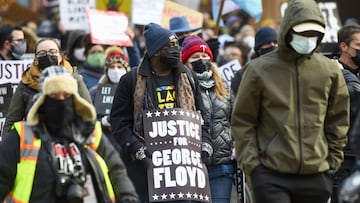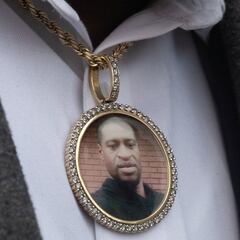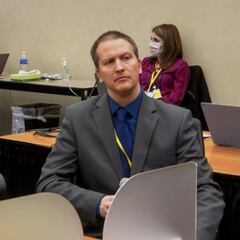Derek Chauvin jury verdict live online: George Floyd Death Trial | Deliberation, possible charges...
The jury has reached a verdict in the trial of Derek Chauvin, charged with the murder of George Floyd that prompted millions to protest police brutality


Throughout the three-week trial in the case of Derek Chauvin, the jury heard from forty-five witnesses, including medical experts, police leadership, George Floyd’s friends and family, and witnesses at the scene. On 19 April, jury deliberation began in the trial after both the prosecution and defense rested their cases in one of the most closely followed legal cases in recent history. The jury will have to decide whether Mr. Chauvin is innocent or guilty of second-degree unintentional murder, third-degree murder, or second-degree manslaughter, which carry a maximum sentence of forty, twenty-five, or ten years in prison, respectively.
What were the final arguments made by the prosecution?
The State used their time for closing arguments to reiterate what medical experts, police leaders, and witnesses said in their testimony. The prosecution's closing argument lasted nearly two hours and covered many of the critical moments of the trial.
Specifically, the prosecutor, Mr. Schleicher, walked the jury through video footage of Mr. Floyd’s arrest leading up to the point where Mr. Chauvin knelt on Mr. Floyd’s neck for over nine minutes. Mr. Schleicher also used his time to restate the findings of the medical experts, including the medical examiner who ruled Mr. Floyd’s death a homicide after completing his autopsy.
The State also reminded the jury of comments made by police leadership, including Minneapolis police chief Medaria Arradondo’s statement that what he saw in the video evidence did not comply with police policy and violated the “ethics and values” of the department.
While closing his remarks, the prosecution told the jury that they are the only ones with “the power to convict the Defendant of these crimes, and in so doing declare that this Use of Force was unreasonable, it was excessive.”
What were the final arguments made by the defense?
Defense attorney, Eric Nelson, spoke for close to three hours during his closing remarks, restating the case he had laid out before the court. Throughout the trial, Mr. Nelson had tried to move the focus away from the nine-minute and twenty-nine-second video that prompted widespread protests around the world, saying, “The use of force is an incredibly difficult analysis. You can’t limit it to nine minutes and 29 seconds.” Mr. Nelson believed that “all information has to be taken” into account, including the “17 minutes before that nine minutes and 29 seconds.”
To bolster their argument and sow doubt in the case made by prosecutors, the defense focused on aspects of the case, including why the officers thought the level of force used was justified saying that Mr. Floyd was “large [...] and possibly under the influence of alcohol or something else.”
In defending his client, Mr. Nelson urged the jury to look at the case from the perspective of a police officer and “take into account that officers are human beings, capable of making mistakes in highly stressful situations.” The defense lawyer acknowledged that the footage shown before the court was “unattractive” and reminded the jury that “Reasonable police officers are aware when they're using force that sometimes what they're doing does not look good to the general public.” Making this point is critical to the defense’s cases because they argued that optics have little to do with determining whether or not the use of force was justifiable beyond a reasonable doubt.
How long will the jury have to deliberate?
Related stories
Closing arguments wrapped up relatively late on Monday, 19 April, giving the jury only one hour to deliberate until being sent home. Before releasing the jury for deliberation, Judge Peter Cahill reminded the jury that their decision should not be based on “bias, prejudice, passion, sympathy or public opinion.”
Until a decision is made, the jury will deliberate from 9 AM to 9 PM CDT and may go through the weekend if necessary.

